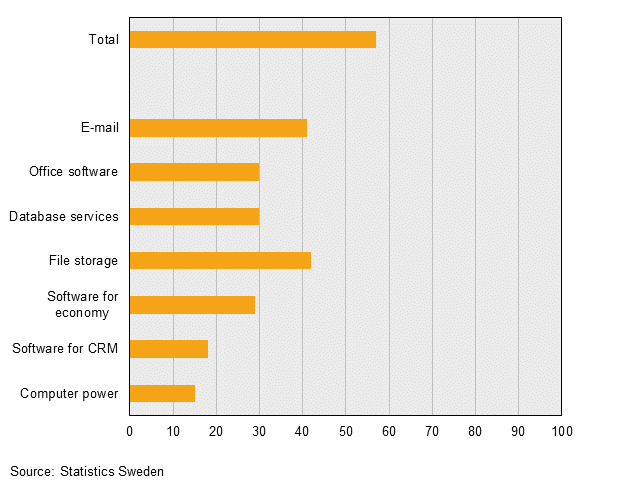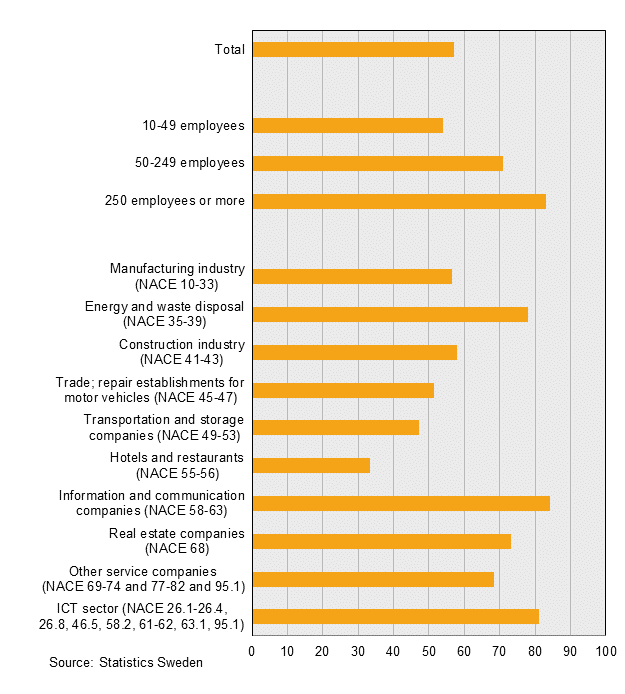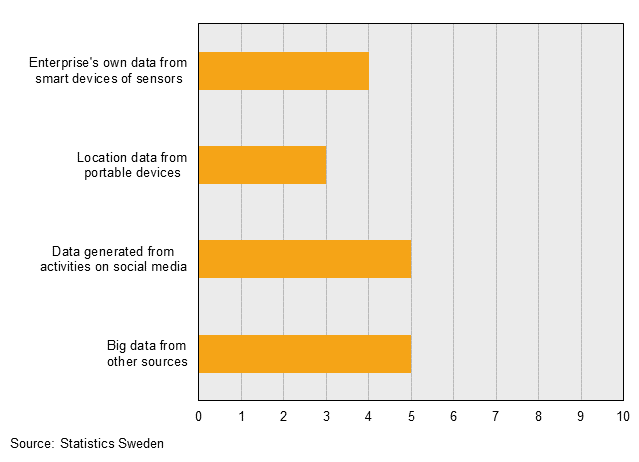ICT usage in enterprises, 2018:
Use of cloud services is increasing among enterprises
Statistical news from Statistics Sweden 2018-11-29 9.30
The share of Swedish enterprises that purchased cloud services increased between 2016 and 2018. The most common cloud services that enterprises purchased were file storage and e-mail services. These shares increased from 33 percent to 42 percent, and from 32 percent to 41 percent, respectively between 2016 and 2018.
In 2018, 57 percent of all enterprises with 10 employees or more purchased some type of cloud service. File storage was the most common type of cloud service purchased by enterprises, followed by e-mail services. Computer power to run proprietary software was the least purchased service by enterprises. The share of enterprises that purchased this service increased between 2016 and 2018 from 12 percent to 15 percent.

Enterprises that purchased cloud services most often shared servers with other enterprises. About 33 percent of the enterprises purchased cloud services with this option, while 21 percent purchased a dedicated server.
Use of office software, such as word processing or spreadsheets, and use of database services increased the most, from 21 percent in 2016 to 30 percent in 2018. Purchases of software for accounting and financial management and software for managing customer information also increased considerably. Broken down by industry classification, mainly enterprises in the information and communication industry, 84 percent, purchased cloud services. Enterprises in the ICT sector were the second largest purchasers of cloud services, 81 percent.

The share of industries in which the use of cloud services was the most common has increased slightly each year in recent years. However, the largest increase occurred in the energy and recycling industry, in which the share of enterprises using some type of cloud service increased by 37 percentage points since 2015 and by 28 percentage points since 2016. Among the various industries, the hotel and restaurant industry purchased the least cloud services.
Due to their flexibility, cloud services are also useful for handling data intensive applications. Cloud services can be used, for example, to tackle big data problems, since handling big data requires large amounts of servers and resources, as well as special techniques for analysis.
Big data and enterprises
Innovation is increasingly driven by the use of digital tools. One of these tools may be the active use of big data by enterprises. It enables the development of new products, processes and organisational methods. The use of big data can also create added value to existing products, such as data services that complement manufactured goods.
In general, all activities conducted electronically (e.g., data from activities on social media or production processes) generate large amounts of data or big data characterised by significant volume, velocity and variation.
The use of big data is still minor among enterprises in Sweden. Among 7 percent of enterprises that analysed big data, analysis was carried out by their own employees, including employees at a parent enterprise or an affiliated enterprise. Among 3 percent of the enterprises, big data analysis was carried out by an external supplier.
In 2017, 5 percent of enterprises analysed big data generated by social media activities. About 4 percent of enterprises analysed the enterprise’s own data generated by smart devices or sensors, and 3 percent of enterprises analysed location data generated by portable devices.

Definitions and explanations
These statistics are based on the survey ICT usage in enterprises and form part of Sweden’s official statistics. The survey contains 120 questions on access to and use of information and communication technologies (ICT) in Swedish enterprises. All statistics presented here, and much more, can be downloaded from the Statistics database on Statistics Sweden’s website.
Regional estimates are reported by national area as defined by NUTS 2.
For international comparisons, please refer to:
Eurostat - Digital economy and society statistics - enterprises
Eurostat will publish their statistics on 13 December 2018.
Next publishing will be
2019-11-20 09.30.
Feel free to use the facts from this statistical news but remember to state Source: Statistics Sweden.
